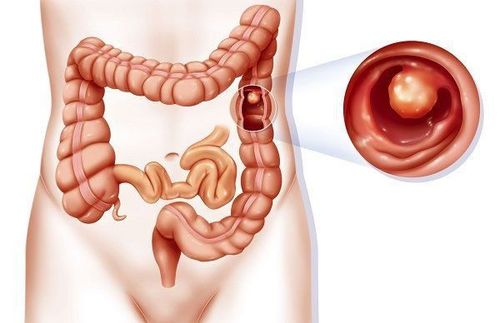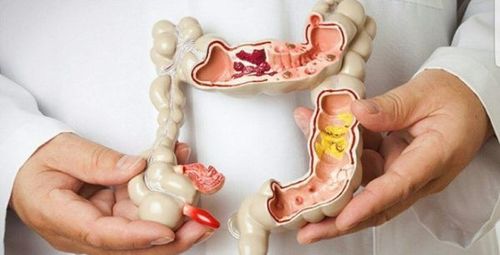This is an automatically translated article.
The article was written by Specialist Doctor I Nguyen Thi Minh Thuyen - Pathologist, Pathology Department - Vinmec Danang International General Hospital.Colorectal cancer is a type of cancer that begins in the colon or rectum. Colon and rectal cancers are often grouped together because they have many features in common.
1. How does colorectal cancer start?
1.1 Polyps in colon or rectum
Most colorectal cancers begin in the inner lining (mucosa) of the colon or rectum. These growths are called polyps.Over time, some polyps can turn cancerous, but not all polyps become cancerous. The likelihood of polyps turning into cancer depends on the type of polyp. The two main types of polyps are:
Glandular polyps: These polyps sometimes turn cancerous. Therefore, adenomas are considered precancerous. Hyperplastic polyps: These polyps are usually benign, small in size, and very rarely cancerous. Other factors that can make polyps more likely to be cancerous or increase the risk of developing colorectal cancer include:
Polyps larger than 1 cm More than 2 polyps After polyp removal Check for possible contrarian. Dysplasia is another precancerous condition. That means there is an area in the polyp or in the lining of the colon or rectum where the cells have abnormal characteristics, but they are not actual cancer cells.

1.2 How does colorectal cancer spread?
If the cancer forms from a polyp, over time it can grow from the wall of the colon or rectum. The wall of the colon and rectum is made up of several layers. Colorectal cancer begins in the innermost layer (mucosa) and can grow outward through some or all of the layers of the colon. Cancer cells can follow lymphatic vessels or blood vessels to travel to nearby lymph nodes or to distant parts of the body. The stage (degree of spread) of colorectal cancer depends on how far it has spread to the layers of the colon wall as well as how far it has spread outside the colon or rectum.
2. What is the role of the colon and rectum?
The colon absorbs water and salts from the remaining food substances after it has passed through the small intestine. The waste that remains after passing through the colon enters the rectum, the final part of the digestive system. They stay there until they are eliminated from the body through the anus.

3. Types of colorectal cancer
3.1 Adenocarcinoma
Adenocarcinoma accounts for about 96% of colorectal cancers. This type of cancer starts in the cells that make mucus to lubricate the inside of the colon and rectum. Some subtypes of adenocarcinoma, such as ring cell adenocarcinoma and mucinous adenocarcinoma, may have a worse prognosis.
3.2 Other types of tumors
Other less common types of tumors include:Carcinoid tumors : They originate in special hormone-producing cells in the intestines. Gastrointestinal stromal tumor (GIST): Originates in special cells in the colon wall called Cajal interstitial cells. This type of tumor can be found anywhere in the gastrointestinal tract, but is less common in the colon. Some of these tumors are benign, not cancerous. Lymphoma: Cancer of the immune system cells. Lymphoma mainly originates in the lymph nodes, but can also be from the colon, rectum, or other organs. Sarcoma: Can originate in the blood vessels, layers of muscle, or other connective tissue in the wall of the colon and rectum. Sarcoma of the colon or rectum is rare.

The best way to prevent and protect the health of you and your family, everyone should get cancer screening as soon as possible. Should be repeated every 6 months, 1 year, 2 years... Periodic and correct cancer screening will help detect precancerous lesions early, thereby providing a chance for a cure.
Vinmec International General Hospital is one of the most prestigious and modern hospitals in Vietnam. Here, rectal cancer screening packages are provided to help customers be proactive and prevent the disease.
Please dial HOTLINE for more information or register for an appointment HERE. Download MyVinmec app to make appointments faster and to manage your bookings easily.
Reference article source: American Cancer SocietyMORE:
Rectal tumor: What you need to know Is colorectal cancer curable? What can be done to detect colorectal cancer early?














